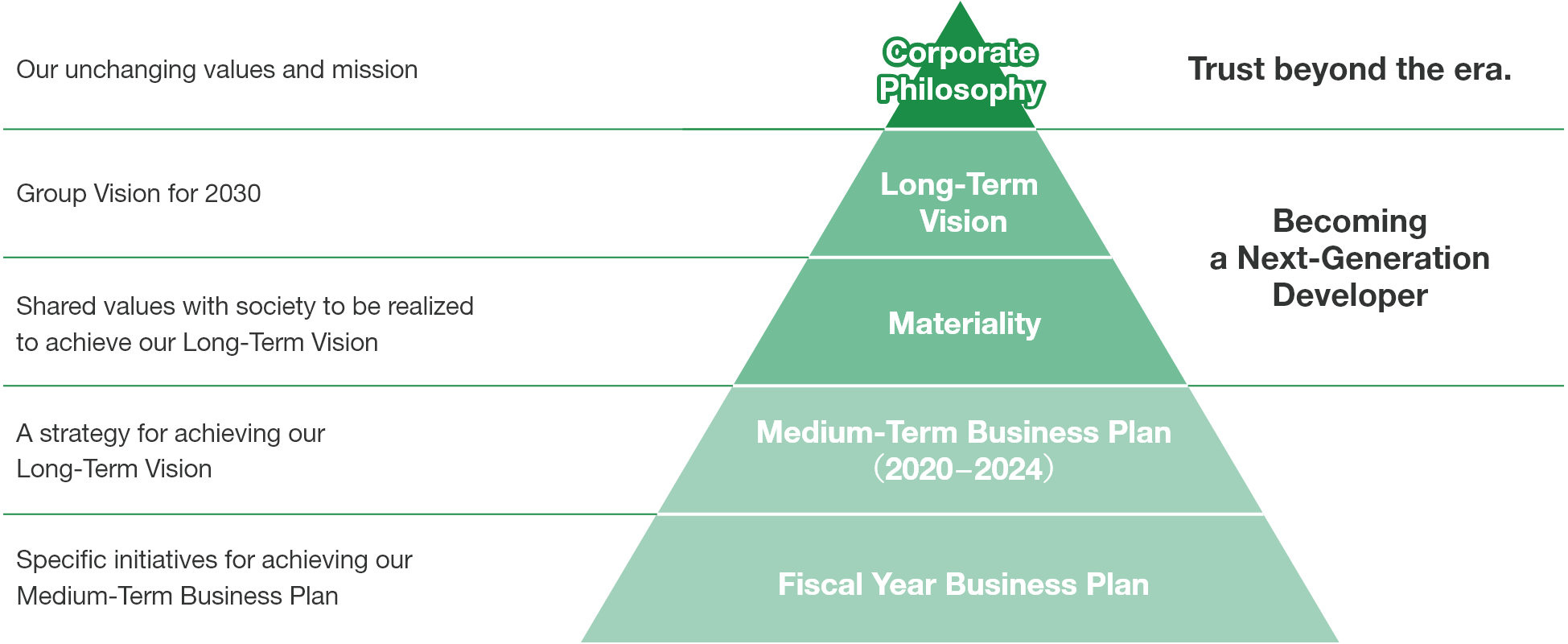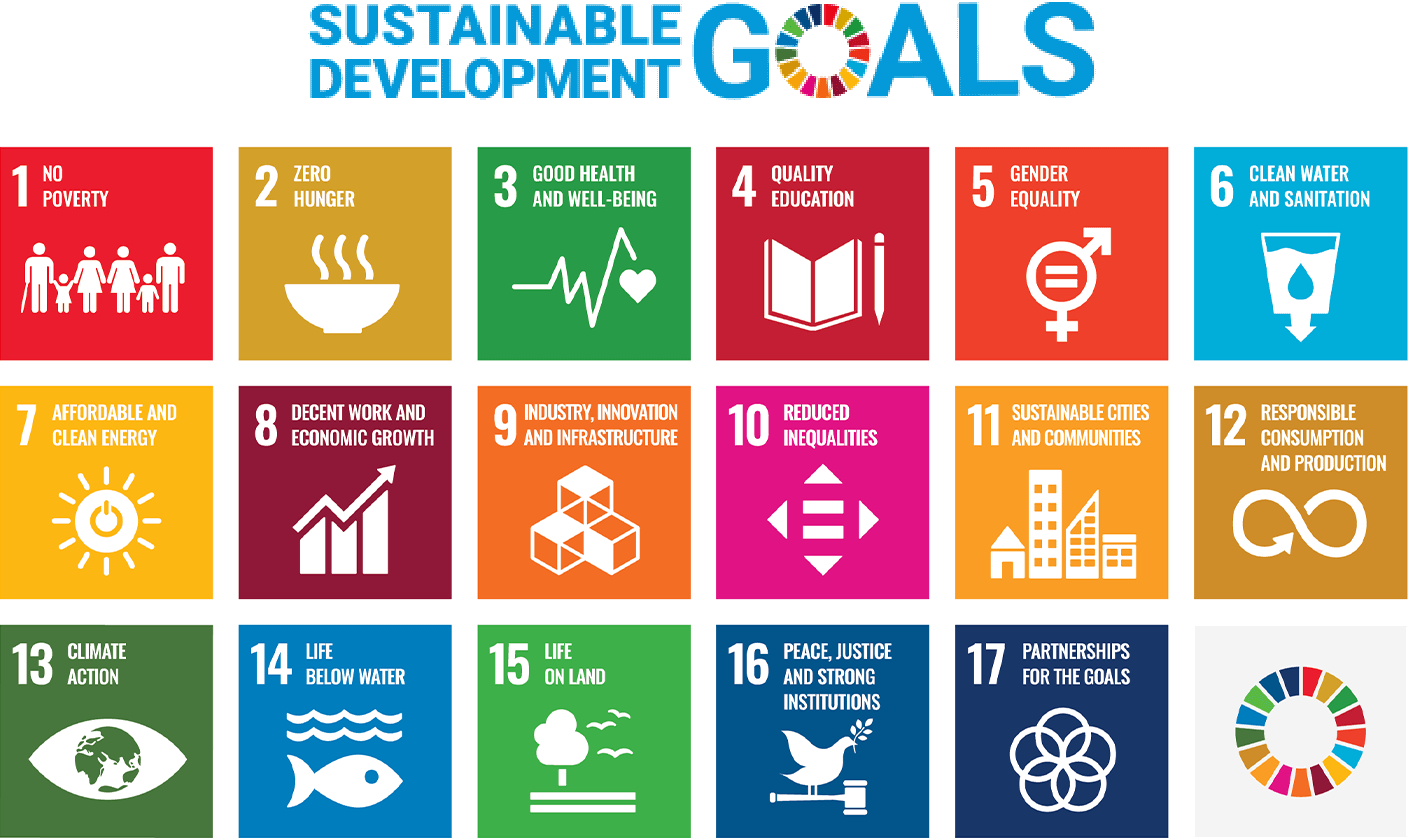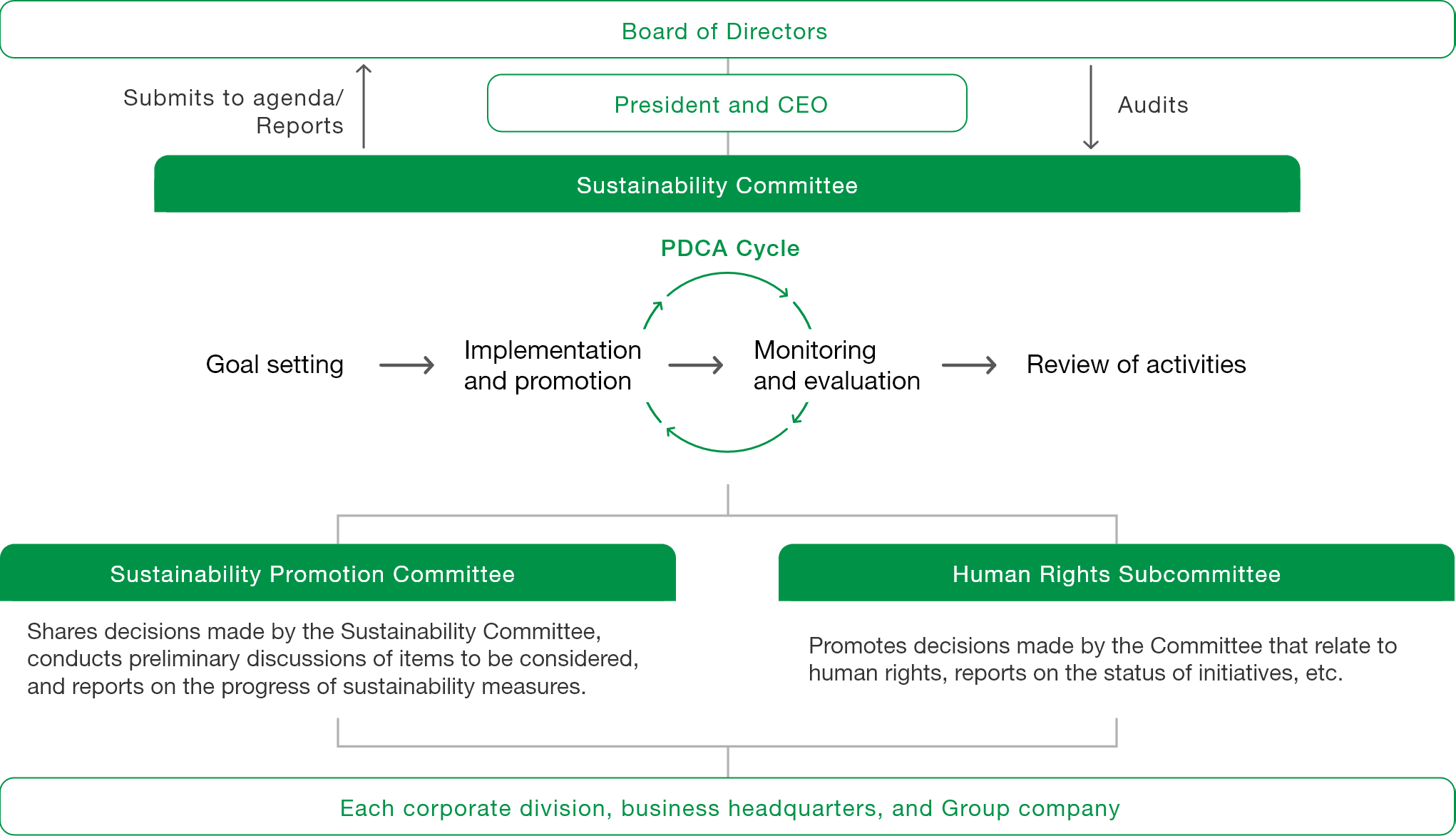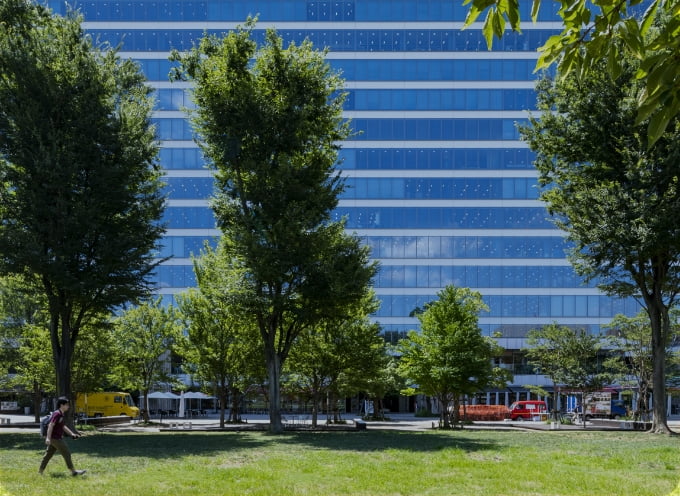ESG Management
Overview of ESG Management at the Tokyo Tatemono Group
The Tokyo Tatemono Group pursues an evolved approach to ESG management, proactively implementing sustainability measures throughout its operations. We strive to achieve a balance between solutions to social issues and corporate growth.
ESG management has grown ever-more important in recent years, amid intensifying changes in the business environment. We formulated a Long-Term Vision for the Group in 2020 and established a sustainability promotion framework under which the entire Group has come together to pursue initiatives for sustained growth.
Our Long-Term Vision looks ahead to 2030. This is our planned timing for completing our current large-scale redevelopment projects and also the target year for the Sustainable Development Goals (SDGs).
-
Focus Factors in the External Environment
-
- Intensified competition between cities internationally
- Changes in the financial environment
- Decrease in population and working-age citizens in Japan
- Diversification of work styles and lifestyles
- Intensification of competition to recruit human resources
- Acceleration of digital technology advances and globalization
- Rising ESG awareness
- Greater geopolitical risks and natural disaster risks
Positioning of Long-Term Vision

Our Approach to the SDGs
The Tokyo Tatemono Group recognizes the demand from society to help achieve the SDGs. We have incorporated the SDGs into our long-term vision and medium-term management plan and are actively implementing sustainability measures throughout the Group.
As we operate our business as a developer, we will continue to be guided by the aim of realizing a sustainable society.

ESG Management Framework
The Tokyo Tatemono Group established the Sustainability Committee, chaired by our president and CEO, to pursue sustainability measures across the entire Group. We also established the Sustainability Promotion Committee and Human Rights Subcommittee as subordinate organizations.
The Sustainability Committee, like the Executive Committee, Risk Management Committee and Internal Control Committee, is under the direct control of the president and CEO. It meets in principle at least twice a year, to discuss important ESGrelated issues, set targets, monitor progress, and evaluate achievements. Matters discussed by the Sustainability Committee are reported to and supervised by the Board of Directors as necessary. The Sustainability Committee met seven times during fiscal 2022.
The Sustainability Promotion Committee shares decisions of the Sustainability Committee, conducts preliminary discussions for consideration, and reports on the progress of sustainability measures.
The Human Rights Subcommittee promotes decisions made by the Sustainability Committee regarding human rights and reporting on the status of initiatives.
ESG Management Framework

-
Main Agenda Items of the Sustainability Committee (FY2022)
-
- Establishing additional KPIs and targets for promoting a circular society
- Identifying priority issues for human rights
- Roadmap for reducing greenhouse gas emissions
- Establishing a Human Rights Subcommittee
- Reporting on implementation status of targets for promoting a decarbonized society
ESG-related KPIs and Targets; Progress
The Tokyo Tatemono Group believes that advancing ESG management will help to maximize the medium- and long-term benefits for our stakeholders. We have set ESG-related KPIs and targets based on the material issues we identified in 2021. In particular, we are focusing our efforts on the area of climate change, in response to the demands of the public toward a decarbonized society.
In terms of reducing greenhouse gas emissions in the Group, we have set medium- to long-term targets of achieving a 40% reduction in CO2 emissions by fiscal 2030 compared to fiscal 2019 and net-zero CO2 emissions by fiscal 2050. These targets are guiding our efforts to realize a decarbonized society. In addition, we have set the shift to renewable energy, promotion of development of ZEB and ZEH, and acquisition of green building certification as process targets for achieving the medium- and long-term targets. We are striving to develop real estate equipped with energy-saving equipment and other technologies that offer superior environmental performance, while working with building management companies and tenants on operational initiatives.
We have incorporated action plans that take these process targets into consideration into the business plans of each business division or business unit. The Sustainability Promotion Committee monitors the status of these efforts, while the Sustainability Committee manages progress toward achieving the targets using a PDCA cycle. Progress is reported to and supervised by the Board of Directors.
Material Issue KPIs and Targets
Environment-related
| Material issues | Item | Scope | KPIs and Targets | |
|---|---|---|---|---|
| Promoting a decarbonized society | Reduction in greenhouse gas emissions | All businesses | Scope1・2・3 | Net zero CO2 emissions by FY2050 |
| Scope1・2 | 46.2% reduction in CO2 emissions compared to FY2019 by FY2030 | |||
| Scope3*1 | 40% reduction in CO2 emissions compared to FY2019 by FY2030 | |||
| Shift to renewable energy | All businesses | By FY2050, procure 100% of electricity consumed in business activities from renewable energy sources | ||
| Office buildings | By FY2030, procure 100% of electricity consumed at owned real estate from renewable energy sources | |||
| By FY2024, procure at least 50% of electricity consumed at owned properties from renewable energy sources | ||||
| Promotion of development of ZEB and ZEH*2 | Office buildings | Develop ZEB for, in principle, all new office buildings and logistics properties*3 | ||
| Residences | Develop ZEH for, in principle, all new sales of condominiums and leasing condominiums*4 | |||
| Acquisition of Green Building Certification*5 | Office buildings Residences |
Acquire Green Building Certification for, in principle, all new office buildings, logistics properties, and condominiums for rent, etc.*6 | ||
| Promoting a recycling-oriented society | Reduction of waste emissions | Long-term buildings*7 | By FY2030, 20% reduction in the rate of waste emissions per unit compared with FY2019 | |
| Waste recycling promotion | Long-term buildings*7 | By FY2030, achieve a waste recycling rate of 90% | ||
| Reduction of water consumption | Long-term buildings*8 | Reduction of water consumption per unit compared with previous fiscal year | ||
| Promotion of use of recycled water | Office buildings with total floor area exceeding 30,000m2 | By FY2030, install gray water*9 treatment facilities at, in principle, all new office buildings with a total floor area of more than 30,000m2 | ||
| Promoting a decarbonized society / Promoting a recycling-oriented society | Promotion of use of wood materials | Long-term buildings and condominiums for sale or rent | By FY2030, use domestic timber and certified timber in the interior and furniture of common areas of all new office buildings,for-sale and for-rent condominiums, etc. | |
| Condominiums for sale or rent | By FY2023, develop for-sale and for-rent condominiums that use CLT for major structural components | |||
| Collaboration and co-creation with customers | Long-term buildings*7 | Communicated with tenants about sustainability at least 4 times a year | ||
| Condominiums for sale or rent | Communicate with residents and plan and implement sustainability measures | |||
-
Applies to categories 11 and 13.
-
In addition to "ZEB" and "ZEH(-M)", includes Nearly ZEB, ZEB Ready, ZEB Oriented, Nearly ZEH(-M), ZEH(-M) Ready, and ZEH(-M) Oriented.
-
Applies to new buildings for which design work began in January 2023 or later. Excludes certain properties such as joint venture properties or properties with special uses.
-
Applies to new buildings for which design work began in June 2021 or later. Excludes certain properties such as joint venture properties or properties with special uses.
-
Mainly refers to DBJ Green Building certification, CASBEE building and BELS (Building Energy Saving Performance Labeling System) certification.
-
Applies to new buildings for which design work began in January 2023 or later. Excludes certain properties such as joint venture properties or properties with special uses.
-
Applies to the main long-term buildings and commercial facilities for which we have substantial energy management rights and for which we have submitted plans for the reuse and reduction of waste materials.
-
Applies to the main long-term buildings and commercial facilities for which we have substantial energy management rights.
-
Recycled water derived from rainwater and miscellaneous wastewater generated in buildings (e.g., wastewater from cooling towers and tenants' kitchens). It is reused for non-potable purposes such as toilet flushing and watering plants.
Society-related
| Material issues | Item | Scope | KPIs and Targets |
|---|---|---|---|
| Improve employee growth and job satisfaction | Promotion of skills development | Tokyo Tatemono | Average training time per employee Each fiscal year 15 hours or more |
| Tokyo Tatemono | Career training participation rate Each fiscal year 100% | ||
| Promotion of health management | Tokyo Tatemono | Health checkup rate and follow-up test rate Each fiscal year 100% | |
| Tokyo Tatemono | Smoking rate Every fiscal year 12% or less | ||
| Tokyo Tatemono | Ratio of individuals maintaining ideal body weight 75% or more by FY2028 | ||
| Diversity & Inclusion | Respect for human rights | Tokyo Tatemono Group | Dissemination of the Human Rights Policy Deployment to and compliance by group companies |
| Work-life balance | Tokyo Tatemono | Average annual paid leave utilization rate Each fiscal year 70% or more | |
| Tokyo Tatemono | Ratio of male employees taking parental leave By fiscal 2025 30% or more | ||
| Promotion of diversity in our workforce | Tokyo Tatemono | Ratio of women in management positions 10% or more by fiscal 2030 | |
| Tokyo Tatemono | Employment rate of people with disabilities Each year 2.3% or more |
Stakeholder Engagement
Tokyo Tatemono Group's business activities are supportednot only by the customers who use our products and services,but also by many other stakeholders, including localcommunities, employees, shareholders, investors, and businesspartners. We believe that building long-term relationships oftrust with these stakeholders is essential to our businessactivities. By incorporating their input in various ways, we areworking to create value.
Stance on and Approach to Dialogue with Our Core Stakeholders
| Stakeholders | Stance on Dialogue | Approach to Dialogue |
|---|---|---|
| Customers Building tenants, home buyers, users of services |
We established various systems to incorporate customer feedback in our business activities. We use these systems to provide valuable products and services that offer safety and peace of mind, while continuously improving customer satisfaction. |
|
| Local community Local community around properties, local governments, etc. |
We work to increase local value and contribute to the local community through efforts that include community development and various community activities. |
|
| Employees | We work to create a satisfying workplace in which employees can experience personal growth. We strive to develop people who are trusted and capable of building the future. |
|
| Shareholders and investors | We aim to build long-term fiduciary relationships with our shareholders and investors and earn appropriate recognition through sincere and fair information disclosure and active communication. |
|
| Business partners Business operators related to planning, development, and property management, and service provision, etc. |
We conduct fair and equal business dealings with our partners and strive for close communications to build even better relationships with these partners. |
|

